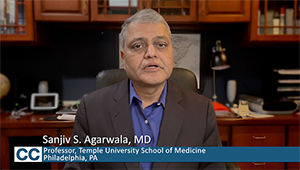In the phase 3 CheckMate-227 study (Part 1a) of nivolumab (NIVO; an anti–PD-1 antibody) plus ipilimumab (IPI; an anti-cytotoxic T lymphocyte antigen-4 antibody),1 adults (N = 1739)1 with treatment-naïve stage IV/recurrent non–small-cell lung cancer (NSCLC), who had no known EGFR/ALK alterations and European Cooperative Oncology Group performance status ≤1,2 received either NIVO (3 mg/kg every 2 weeks) plus IPI (1 mg/kg every 6 weeks) or chemotherapy (Part 1a).1,2
The primary measure of efficacy was overall survival (OS) with NIVO plus IPI versus chemotherapy in patients with PD-L1 ≥1%.2 Safety outcomes were management and timing of immune-mediated adverse events.1
At the primary analysis, with a median follow-up of 29.3 months, the median OS was 17.1 months (95% confidence interval [CI], 15.0-20.1) for patients with PD-L1 ≥1% treated with NIVO plus IPI and 14.9% (95% CI, 12.7-16.7) for those treated with chemotherapy alone (hazard ratio [HR], 0.79; 95% CI, 0.67-0.94; P = .0066).3
Based on CheckMate-227, NIVO plus IPI was approved in the United States for adults with metastatic NSCLC who express PD-L1 ≥1% with no EGFR or ALK mutations for first-line treatment.1
At the American Society of Clinical Oncology 2021 Annual Meeting, researchers presented extended 4-year follow-up data for the CheckMate-227 trial. With a median follow-up of 54.8 months, the OS for patients with PD-L1 ≥1% was 29% for NIVO plus IPI compared with 18% for chemotherapy (HR, 0.76; 95% CI, 0.65-0.90).1 For the group of patients with PD-L1 ≥50%, at 4 years, the OS rate was 37% for NIVO plus IPI compared with 20% for chemotherapy.1
At 2 years, the progression-free survival (PFS) rate for patients with PD-L1 ≥1% was 22% and 7% for the NIVO plus IPI and chemotherapy-alone groups, respectively. In this study, the PFS rate at 4 years was 14% for patients who received NIVO plus IPI, compared with 4% for those who received chemotherapy alone.1 For the PD-L1 ≥50% group, the 4-year PFS rates were 20% and 1% for the NIVO plus IPI and chemotherapy-alone groups, respectively.1
At 2 years, for patients with PD-L1 ≥1%, the mean duration of response (DOR) was 50% for the patients treated with NIVO plus IPI compared with 13% for patients treated with chemotherapy. After 4 years, the DOR was 34% for NIVO plus IPI and 7% for chemotherapy.1 The histology of the cancers was divided into squamous and nonsquamous; there was no difference in outcomes between these 2 groups2; the PFS and DOR for both groups at 4 years were improved.1
For the PD-L1 ≥50% group, at the 4-year follow-up, 40% of the NIVO plus IPI group remained in response and 3% of the chemotherapy group remained in response.1
Analysis of safety revealed that treatment-related adverse events (TRAEs) that caused patients to discontinue treatment occurred in 18% of patients treated with NIVO plus IPI and 9% of those treated with chemotherapy.1 Safety data also showed that the most common TRAE that was immune-mediated with NIVO plus IPI was rash (19%).1 Other immune-mediated adverse events were transaminitis, adrenal insufficiency, pneumonitis, and diarrhea.1 These occurred ≤6 months after treatment was started and resolved ≤3 months after; they were generally treated with systemic corticosteroids.1 The most common TRAE that led to patients discontinuing treatment with NIVO plus IPI was pneumonitis (3.6%).1 Despite discontinuing NIVO plus IPI, patients with TRAEs still had long-term OS (44%).1 There were no new treatment-associated deaths reported at the 4-year follow-up.1
The investigators found that after 4 years of follow-up, patients with advanced NSCLC maintained long-term OS and better PFS when treated with NIVO plus IPI than those treated with chemotherapy alone, irrespective of histology or PD-L1 expression.1,2
References
- Paz-Ares LG, Ramalingam SS, Ciuleanu TE, et al. First-line nivolumab plus ipilimumab in advanced non-small cell lung cancer: 4-year outcomes from the randomized, open-label, phase 3 CheckMate 227 part 1 trial. J Thorac Oncol. Published online October 11, 2021. 2021;S1556-0864(21)03207-X.
- Paz-Ares LG, Ciuleanu TE, Lee JS, et al. Nivolumab (NIVO) plus ipilimumab (IPI) versus chemotherapy (chemo) as first-line (1L) treatment for advanced non-small cell lung cancer (NSCLC): 4-year update from CheckMate 227. J Clin Oncol. 2021;39(suppl_15):9016-9016.
- Hellman MD, Paz-Ares L, Bernabe Caro R. Nivolumab plus ipilimumab in advanced non–small-cell lung cancer. N Engl J Med. 2019;381:2020-2031.


